
WAVE Game Studios is a name you will be familiar with if you recently bought a copy of Senile Team's excellent Dreamcast platformer-cum-beat 'em up
Intrepid Izzy
, and has recently announced that they will also be publishing
Yeah Yeah Beebiss II
in Europe. The UK-based outfit has been busy establishing itself as the hottest new label in Dreamcast indie game publishing, and we thought it would be cool to catch up with WAVE as they start to make a splash in the community. Splash? Wave? See what I did there? I almost went for 'dipping a toe in' but pulled myself back from that particular cringeworthy literary cliff edge with mere keystrokes to spare.
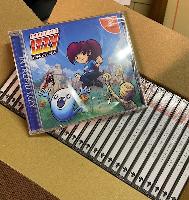
Anyway, if you're not familiar with WAVE Game Studios, their history, and what they have planned for the future; hopefully you will be by the end of this interview. Furthermore, if you're an independent developer working on a Dreamcast game and you have dreams of putting your game in a physical case and into the GD-ROM drives of Dreamcasts the world over, then read on...
DCJY:
Hi, thanks for agreeing to talk to us about WAVE Game Studios. Before we begin, can you give us little bit of background about who makes up the team?
WAVE Game Studios:
It’s our pleasure! WAVE is primarily made up of two brothers, Daniel and Nick. We’re based in Norwich, Norfolk, UK.
Norfolk, known for Alan Partridge, mustard...and now WAVE Game Studios! So, when was WAVE Game Studios established and what was the reasoning being the creation of the label?
WAVE has a fairly long history, but the most recent incarnation stems back to 2015 which is when we started distributing games to UK based retailers. We really started to ramp up our efforts this year, which is when we began publishing games in addition to just distributing them.
That’s interesting – this might sound like a daft question, but what is the main difference between distributing and publishing a game?
It’s a very good question. The role of a publisher is to, in short, take a game and turn it into a saleable product. Usually the publisher will help with artwork, marketing, production, and various other tasks such as providing review copies to magazines and influencers.
The distributor, on the other hand, deals primarily with ensuring the product is available for sale in as many appropriate places as possible. In the indie games world, these two roles are often (but not always) filled by the same company or person.
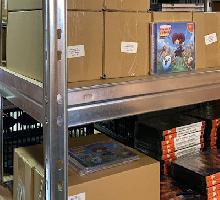 Why then, did you specifically target the Dreamcast indie market as a place to start publishing?
Why then, did you specifically target the Dreamcast indie market as a place to start publishing?
The Dreamcast scene has always been interesting to us. The relative ease of developing games for the system has given rise to some very cool titles over the years, and as you know there are quite a number of talented developers writing for the system to this day. We got involved initially because it has always pained us that despite some of these games being incredible, the wider audience of Dreamcast fans are not even aware that they exist. We had an opportunity to fix that, and we ran with it.
Good point - it’s true that some of the lesser-known Dreamcast titles slip through the cracks. What’s your history with the Dreamcast? Were you fans from day one, or did you come to the system later on?
That’s a great question, because the truth is neither of us owned a Dreamcast until long after it was discontinued. I remember back in 1999, we desperately wanted one after playing the demo unit at our local supermarket, but couldn’t afford it at the time. We didn’t come from the wealthiest family, so most of our consoles were handed down from older cousins once they were done with them. For example we first played a Mega Drive in around 1997.
Tell me about it – I had to share consoles with my brother at one point, which lead to many heated arguments about what games we would play. He threw a Sega Multi-Mega at me once. Long story. Are there any Dreamcast indie titles you’re particularly impressed with? Any that you would like to have published yourself if you were given the chance?
At this point I’d be happy to have a Multi-Mega thrown at me, providing I can keep it in my collection! The original Rush Rush Rally Racing was actually the game which finally convinced us to pick up a Dreamcast, way back in 2009. At the time most indie games for the system were shmups, so it was a real breath of fresh air. A few years later, the same publisher put out Sturmwind which remains a firm favourite of mine to this day.
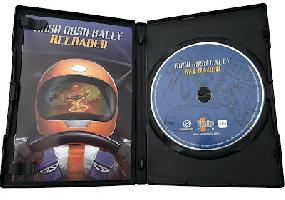 Rush Rush Rally Racing is indeed a favourite amongst the community. Oh, and that Multi-Mega narrowly missed my head. Moving swiftly on, what do you think the future holds for indie Dreamcast development? Do you see the frequency and volume of new titles increasing? If so, why do you think that is?
Rush Rush Rally Racing is indeed a favourite amongst the community. Oh, and that Multi-Mega narrowly missed my head. Moving swiftly on, what do you think the future holds for indie Dreamcast development? Do you see the frequency and volume of new titles increasing? If so, why do you think that is?
That’s the million-dollar question. There are undoubtedly more games coming out for the Dreamcast now, and we suspect the reason is there are a couple of publishers who are helping to make the logistical side of publishing Dreamcast games easier.
In the past, games would be developed usually by one person, who then had to publish, sell, advertise, and distribute the game all by themselves. After all that work, sales wouldn’t necessarily make up for the time spent. This undoubtedly created a barrier which made it harder to justify the effort. Thankfully this is now changing.
You mentioned Rush Rush Rally Racing, and that is a game you now distribute through your website. Can you tell us little about how you got involved with Senile Team, and became the publisher for Intrepid Izzy?
We’ve actually been fans of Senile Team since day one. Almost two decades ago, we were avid members of their forum and became experts at creating mods for their open-source Beats of Rage engine. We eagerly anticipated their every release. When Izzy was announced, we were among the first to back the Kickstarter. Right before release, Brexit happened, and it became evident that shipping copies to the UK would be a headache, so we offered to distribute it here.
Being the mad lads that we are, the idea of visiting every single retro game store in the UK was floated and we ended up actually doing it. Over 100 locations were visited throughout October and November. Turns out the UK retro gaming public love the idea of new games for old consoles!
Long story short, we completely sold out within a couple of weeks and needed more copies very quickly. That’s when the idea of publishing came about, and Roel at Senile Team was keen for us to take that additional task off his hands so he could concentrate on what he does best, which is making games.
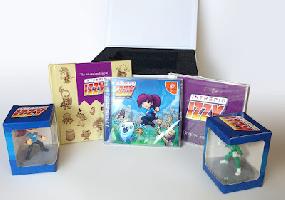 You make a good point about the impact of Brexit – has that whole thing been a bit of a silver lining for you as a UK based publisher? Some EU based publishers are now asking for minimum spends on their websites for sales to the UK – do you think being based where you are makes you more attractive to developers who want to sell to UK Dreamcast owners and mitigate ridiculous import costs?
You make a good point about the impact of Brexit – has that whole thing been a bit of a silver lining for you as a UK based publisher? Some EU based publishers are now asking for minimum spends on their websites for sales to the UK – do you think being based where you are makes you more attractive to developers who want to sell to UK Dreamcast owners and mitigate ridiculous import costs?
To be honest it does work both ways, so whilst it has meant more sales from UK buyers who might have otherwise gone to a European supplier, it also means fewer Europeans buying from the UK.
For developers who want to target UK buyers though, the fact we’re UK based means the whole process is incredibly smooth from their perspective. We pay them (in advance) a license fee for every copy we manufacture, and they don’t need to think about anything else. We handle it all.
That’s also a big part of why we focus so heavily on real world shops, because there is now a financially viable way for them to stock these games. In that sense, it’s something of a blessing.
Going back to Intrepid Izzy, it is widely regarded as one of the most polished indie games to hit the Dreamcast and it follows an upward trend in quality when it comes to recent releases. Games such as Xenocider and Xeno Crisis have also set new benchmarks – do you think indie devs have finally got the tools to start to push the boundaries of indie game development?
As I alluded to earlier, the barriers for entry are slowly going away. Development tools are maturing, the cost of production has come down, and the audience is there waiting for new games. Providing the games coming out are good (and there are some truly amazing titles out now and coming soon) there will always be an appetite for new Dreamcast software.
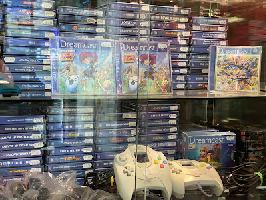 One last question about Intrepid Izzy - how does it feel that WAVE Game Studios was behind retro gaming stores across the UK stocking a brand new physical Dreamcast game for the first time in almost 20 years?
One last question about Intrepid Izzy - how does it feel that WAVE Game Studios was behind retro gaming stores across the UK stocking a brand new physical Dreamcast game for the first time in almost 20 years?
I don’t think we’ve really had time to process it yet! If you asked any of the gaming stores we approached, they would all tell you that they were as surprised as us that nobody has tried this before. Hopefully now that we’ve paved the way, others will do the same. The demand is definitely there.
Other than indie titles, what are your favourite ‘official’ games released for the Dreamcast? And do you have any you can’t stand?!
This is going to sound like the most “basic Dreamcast fan” list ever, but the best sellers are best sellers for a reason. Sega Rally, Sonic Adventure, Crazy Taxi, Dead or Alive, SoulCalibur. There are too many to mention. I don’t think there’s any game I can’t stand, but I can think of a few popular ones which I could never get into. Shenmue being one of those, I’m afraid to say, though I appreciate the artistry which went into making it.
Yeah, Shenmue is a game that divides opinion for sure. Are there any upcoming games you are allowed to mention that you may be bringing to Dreamcast with a physical release?
We just announced a fun little platformer game by YouTuber John Riggs called Yeah Yeah Beebiss II, which is the sequel to a game which never existed. Quite an interesting concept. We also have a few more on our release calendar for next year, but I can’t give much away yet. We’ll be announcing and demoing some of these titles in January at OLL ‘22, which is a
games convention local to us in Norwich
.
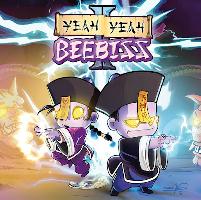 Yeah, Beebiss is a great 'get' and a really fascinating little gaming rabbit hole in its own right. It’s also great that physical events are starting to happen again, and OLL ‘22 looks like it will have a great lineup of guests and exhibitors (our own James Jarvis will be there with ItsMuchMore). Will this be your first event as a publisher? If so, will WAVE Game Studios become a regular at future events do you think?
Yeah, Beebiss is a great 'get' and a really fascinating little gaming rabbit hole in its own right. It’s also great that physical events are starting to happen again, and OLL ‘22 looks like it will have a great lineup of guests and exhibitors (our own James Jarvis will be there with ItsMuchMore). Will this be your first event as a publisher? If so, will WAVE Game Studios become a regular at future events do you think?
We’re definitely looking forward to meeting James, and all the other guests. There are some very cool people booked for that one. It will indeed be our first official event as a publisher, though we’ve been to quite a few as fans over the years. We can’t wait to show everyone what we’re working on!
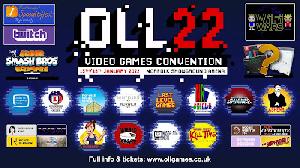 Finally, what would you like to say to any budding indie developers out there who would like to publish a physical game? How can they get in touch with you to see if WAVE Game Studios could possibly assist?
Finally, what would you like to say to any budding indie developers out there who would like to publish a physical game? How can they get in touch with you to see if WAVE Game Studios could possibly assist?
We would absolutely love to chat with indie developers who want to push their games to a wider audience. Our biggest goal is to normalise the idea of new games coming out for retro systems, and make it as mainstream as possible. The audience is there, and we can help to put your work right in front of them. Or if you just want some advice, we’re happy to chat about that too.
The best way to get in touch is via email, which is
on our website
. We’re also on
Twitter
and
Instagram
, if you’re more of a social media fan.
***
Huge thanks to Daniel from WAVE Game Studios for taking the time out to speak with us. As alluded to earlier, WAVE is the publisher of Intrepid Izzy and Yeah Yeah Beebiss II on Dreamcast and we are reliably informed that there are many more games for Dreamcast in the publishing pipeline. Watch this space, as they say. If you'd like to speak to WAVE Game Studios about potentially publishing your project, they are very approachable and contact details can be
found at their website here
.